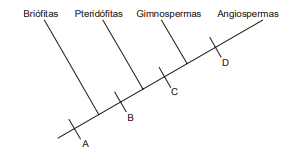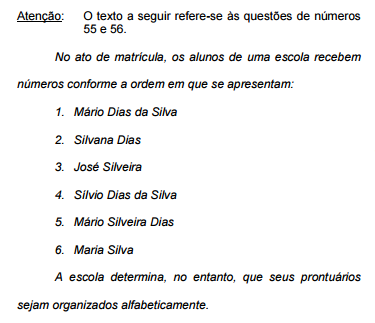Leia o texto abaixo.
Enfermo a 14 de novembro, na segunda–feira o velho Lima voltou ao trabalho, ignorando que no entretempo caíra o regime.
Sentou–se, e viu que tinham tirado da parede a velha litografia representando D. Pedro de Alcântara. Como na ocasião passasse
um contínuo, perguntou–lhe:
— Por que tiraram da parede o retrato de sua majestade?
O contínuo respondeu, num tom lentamente desdenhoso:
— Ora, cidadão, que fazia ali a figura do Pedro Banana?
— Pedro Banana! — repetiu raivoso o velho Lima.
E sentando–se, pensou com tristeza:
— Não dou três anos para que isto seja uma república!
(Arthur de Azevedo. Vidas Alheias (1901). In: Lilia Moritz Schwarcz. As barbas do imperador: D. Pedro II, um monarca nos trópicos.
São Paulo: Companhia das Letras, 1998. p. 470)
Este texto literário indica
A partir do texto, está correto afirmar que a Revolta da Vacina permanece, na história brasileira, como um exemplo de um movimento popular de êxito, baseado na defesa
Com base no texto, está correto afirmar que na Alemanha de Hitler o cinema
A utilização de representações esquemáticas permite ao professor de Biologia integrar conhecimentos e analisar com os alunos
fenômenos naturais envolvendo os seres vivos.
Considere o esquema:
De acordo com o esquema,
O cladograma abaixo refere-se à provável evolução das plantas.

As letras A, B, C e D representam o surgimento de adaptações evolutivas importantes para a conquista do meio terrestre. A respeito da importância dessas adaptações, está correto afirmar que em
Se a base da organização for o último sobrenome, a
ordem correta dos prontuários será
Attention: Read the text and answer questions 21 to 29.
A Writer's Beginnings in Kenya By ALEXANDRA FULLER
ONE DAY I WILL WRITE ABOUT THIS PLACE
A Memoir By Binyavanga Wainaina 256 pp. Graywolf Press. $24.
Dear reader, I'll save you precious time: skip this review and head directly to the bookstore for Binyavanga Wainaina's stand-upand-cheer coming-of-age memoir, "One Day I Will Write About This Place." [CONNECTIVE] written by an East African and set in East and Southern Africa, Wainaina's book is not just for Afrophiles or lovers of post-colonial literature. This is a book for anyone who still finds the nourishment of a well-written tale preferable to the empty-calorie jolt of a celebrity confessional or Swedish mystery. Not that Wainaina is likely to judge [PRONOUN] taste in books. In fact, at its heart, this is a story about how Wainaina was almost [TO EAT] alive by his addiction to reading anything available. "I am starting to read storybooks," he says of his 11-year-old self, growing up in Nakuru, Kenya. "If words, in English, arranged on the page have the power to control my body in this world, this sound and language can close its folds, like a fan, and I will slide into its world, where things are arranged differently." As he leaves childhood [ADVERB 1] − "My nose sweats a lot these days, and my armpits smell, and I wake [ADVERB 2] a lot at night all wriggly and hot, like Congo rumba music" − Wainaina retreats further from the confusing realities of politics and adolescence and his big multinational family (his father a Kenyan businessman and farm owner, his mother a Ugandan salon owner) and deeper into a world of words. At school he is told, and believes, that he is supposed to become a doctor or a lawyer, an engineer or a scientist. But Wainaina seems constitutionally incapable of absorbing anything that would further a career in these fields. By the time Wainaina leaves Kenya to attend university in South Africa, a country smoldering with the last poisonous fumes of apartheid, his addiction to books is complete. He drops out of school to pursue more completely a life of reading.
Adapted from http://www.nytimes.com/2011/08/14/books/review/one-day-i-will-write-about-this-place-by-binyavanga-wainaina-book-review.html?pagewanted=all)
The word head, as used in the text, belongs to which of the following groups?
Attention: Read the text and answer questions 21 to 29.
A Writer's Beginnings in Kenya By ALEXANDRA FULLER
ONE DAY I WILL WRITE ABOUT THIS PLACE
A Memoir By Binyavanga Wainaina 256 pp. Graywolf Press. $24.
Dear reader, I'll save you precious time: skip this review and head directly to the bookstore for Binyavanga Wainaina's stand-upand-cheer coming-of-age memoir, "One Day I Will Write About This Place." [CONNECTIVE] written by an East African and set in East and Southern Africa, Wainaina's book is not just for Afrophiles or lovers of post-colonial literature. This is a book for anyone who still finds the nourishment of a well-written tale preferable to the empty-calorie jolt of a celebrity confessional or Swedish mystery. Not that Wainaina is likely to judge [PRONOUN] taste in books. In fact, at its heart, this is a story about how Wainaina was almost [TO EAT] alive by his addiction to reading anything available. "I am starting to read storybooks," he says of his 11-year-old self, growing up in Nakuru, Kenya. "If words, in English, arranged on the page have the power to control my body in this world, this sound and language can close its folds, like a fan, and I will slide into its world, where things are arranged differently." As he leaves childhood [ADVERB 1] − "My nose sweats a lot these days, and my armpits smell, and I wake [ADVERB 2] a lot at night all wriggly and hot, like Congo rumba music" − Wainaina retreats further from the confusing realities of politics and adolescence and his big multinational family (his father a Kenyan businessman and farm owner, his mother a Ugandan salon owner) and deeper into a world of words. At school he is told, and believes, that he is supposed to become a doctor or a lawyer, an engineer or a scientist. But Wainaina seems constitutionally incapable of absorbing anything that would further a career in these fields. By the time Wainaina leaves Kenya to attend university in South Africa, a country smoldering with the last poisonous fumes of apartheid, his addiction to books is complete. He drops out of school to pursue more completely a life of reading.
Adapted from http://www.nytimes.com/2011/08/14/books/review/one-day-i-will-write-about-this-place-by-binyavanga-wainaina-book-review.html?pagewanted=all)
The missing [PRONOUN] is
Attention: Read the text and answer questions 21 to 29.
A Writer's Beginnings in Kenya By ALEXANDRA FULLER
ONE DAY I WILL WRITE ABOUT THIS PLACE
A Memoir By Binyavanga Wainaina 256 pp. Graywolf Press. $24.
Dear reader, I'll save you precious time: skip this review and head directly to the bookstore for Binyavanga Wainaina's stand-upand-cheer coming-of-age memoir, "One Day I Will Write About This Place." [CONNECTIVE] written by an East African and set in East and Southern Africa, Wainaina's book is not just for Afrophiles or lovers of post-colonial literature. This is a book for anyone who still finds the nourishment of a well-written tale preferable to the empty-calorie jolt of a celebrity confessional or Swedish mystery. Not that Wainaina is likely to judge [PRONOUN] taste in books. In fact, at its heart, this is a story about how Wainaina was almost [TO EAT] alive by his addiction to reading anything available. "I am starting to read storybooks," he says of his 11-year-old self, growing up in Nakuru, Kenya. "If words, in English, arranged on the page have the power to control my body in this world, this sound and language can close its folds, like a fan, and I will slide into its world, where things are arranged differently." As he leaves childhood [ADVERB 1] − "My nose sweats a lot these days, and my armpits smell, and I wake [ADVERB 2] a lot at night all wriggly and hot, like Congo rumba music" − Wainaina retreats further from the confusing realities of politics and adolescence and his big multinational family (his father a Kenyan businessman and farm owner, his mother a Ugandan salon owner) and deeper into a world of words. At school he is told, and believes, that he is supposed to become a doctor or a lawyer, an engineer or a scientist. But Wainaina seems constitutionally incapable of absorbing anything that would further a career in these fields. By the time Wainaina leaves Kenya to attend university in South Africa, a country smoldering with the last poisonous fumes of apartheid, his addiction to books is complete. He drops out of school to pursue more completely a life of reading.
Adapted from http://www.nytimes.com/2011/08/14/books/review/one-day-i-will-write-about-this-place-by-binyavanga-wainaina-book-review.html?pagewanted=all)
Segundo o texto,
KK you ought to remember the past, be prepared to forgive those who have harmed you.
Attention: Read the three job announcements below and answer questions 49-52.
If you want to apply for the vacancy at Southwark College, you should do it
Attention: For questions 53-60, read the text below and decide which answer (A, B, C or D) best fits each gap.
Saving energy: it starts at home We already know the fastest, 53 expensive way to slow climate change: use less energy. With a little effort, and not 54
money, most of us could reduce our energy diets by 25 percent or more − 55 the Earth a favor while also helping our pocketbooks.
So what's holding us back? Scientists have reported recently that the world is heating up even faster KK 56 predicted only a few years KK 57 , and that the
consequences could be severe if we don't KK 58 reducing emission of carbon dioxide and other greenhouse gases that are trapping heat in our atmosphere. But what can we KK 59 about it as individuals? Will our efforts really KK
60 any difference?
(Extracted from the National Geographic Magazine, March 2009)
Attention: For questions 53-60, read the text below and decide which answer (A, B, C or D) best fits each gap.
Saving energy: it starts at home We already know the fastest, 53 expensive way to slow climate change: use less energy. With a little effort, and not 54
money, most of us could reduce our energy diets by 25 percent or more − 55 the Earth a favor while also helping our pocketbooks.
So what's holding us back? Scientists have reported recently that the world is heating up even faster KK 56 predicted only a few years KK 57 , and that the
consequences could be severe if we don't KK 58 reducing emission of carbon dioxide and other greenhouse gases that are trapping heat in our atmosphere. But what can we KK 59 about it as individuals? Will our efforts really KK
60 any difference?
(Extracted from the National Geographic Magazine, March 2009)
A porcentagem em massa de ferro, no cloreto ferroso, é, aproximadamente,
Dados: Massa molar (g/mol): Fe = 56 Cl = 35,5
Um litro de solução de ácido perclórico, HClO4, de pH = 2,0, foi diluído com água até o dobro do volume inicial. O pH da nova
solução
Dados: log 5 = 0,7
log 2 = 0,3




